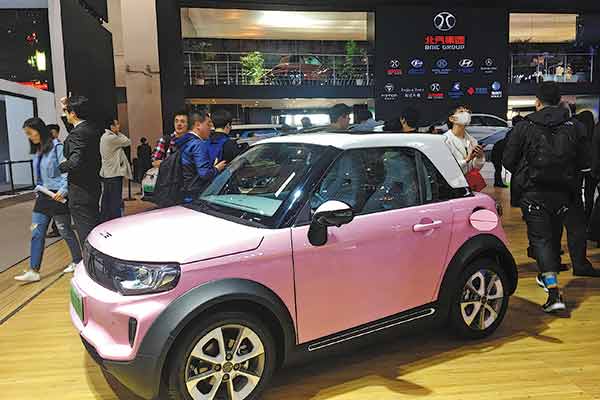Chinese customers' expectations changing


Both owners and potential buyers of new energy vehicles show awareness and acceptance of sector, according to KPMG, Automotive Foresight
New energy vehicles are a new concept for Chinese consumers, with rapid changes taking place in the market, according to joint research conducted by Automotive Foresight and KPMG.
Released in March 2018, the study surveyed 150 new energy vehicle owners in Beijing, Shanghai, Shenzhen, Hangzhou and Jinan.
With a broad range of people included, the research sheds light on three distinct areas: the transformation of new energy vehicle owners' attitudes, experiences and their perception of new related brands.
In the same report, KPMG and AutoForesight also interviewed over 382 potential buyers of such vehicles across Beijing, Shanghai, Shenzhen, Hangzhou, Jinan and Qingdao, to gain insight into a variety of potential customers' views.
The report shows consumers' attitudes towards new energy vehicles are undergoing a transformation, with a growing proportion willing to purchase them. Among those surveyed, 69 percent claim a willingness to purchase new energy vehicles, a 24 percent rise compared with the 2017 survey. Among the 69 percent, 13 percent are strongly in favor.
More so than the ease of gaining a license plate benefits and government subsidies, the day-to-day benefits of owning and driving a new energy vehicle appear to be a significant factor behind consumers' preferences.
They voiced interest in environmentally friendly benefits such as fuel efficiency and lower emissions.
Vehicles' safety performance and warranty periods were also mentioned by the owners.
While new technology is pouring into the automotive industry, new energy vehicle owners are realistic in their expectations, preferring blind spot monitoring and automatic parking over autonomous driving, which is far too distant a reality.
Some 67 percent of new energy car owners charge near their homes and 29 percent expect a quick charge to take under 30 minutes, while 31 percent would say up to 1 hour still counts as a quick charge.
In the previous year's survey, 51 percent said they expect a quick charge to be within 30 minutes.
New energy vehicle owners also seem to have lowered their mileage and speed expectations. In this year's survey, 28 percent-the highest consensus-said they expected a driving range of 251-300 kilometers on one charge, while the largest group last year-42 percent of respondents-voted for 301-400 km. Most said they expect such cars' top speed to be 100 kilometers per hour, while the highest speed expectation of the previous year's survey was 120-150 km/h.
The lower expectations mainly came from more entry-level mini electric vehicle owners in Jinan and Hangzhou.
Although most owners said they are unfamiliar with new brands, 95 percent said they are willing to buy them, as they expect them to feature high quality, novel design and professional services.
More positive perception
Chinese consumers considering buying new energy vehicles are expressing an increasingly positive perception of the sector, with more consumers seeing such vehicles as a conventional option.
With 67 percent commuting up to 20 km per day, as well as 51 percent reporting a weekly travel distance between 50 km and 200 km, new energy vehicles are seen as a reasonable alternative.
The main factors for potential buyers remain unchanged: cost savings (47 percent), environmental friendliness (31 percent), and government subsidies and access to license plates (43 percent combined).
Charging does not seem to be a major concern among potential buyers. When potential customers consider purchasing their first vehicle, five of the top six most recognizable brands are Chinese and one is from the United States.
A number of new-generation domestic brands are also shaking up the market.
Even though the newcomers have yet to create a strong brand identity, the survey findings revealed that the majority of respondents (78 percent) are willing to buy from them.
Brand awareness appears to be the dominant consideration for potential customers, far beyond technical reputation or service efficiency.
Heightened competition could spark new and innovative business models.
Almost 58 percent of potential buyers are open to purchasing a vehicle without a battery and renting one instead.
An increasing number of potential buyers are interested in purchasing vehicles via electronic means (9.2 percent), although retail stores remain the dominant sales channel.
Battery electric vehicles are the most popular type, with 82 percent of potential buyers willing to buy one as their first vehicle.
Innovation & technology
The future of China's new energy vehicles will be shaped by innovation and technology.
While there are still shortcomings in the sector's technology and infrastructure, such issues will be resolved as the market continues to mature and develop. With China already boasting the world's largest new energy vehicle market, Chinese automakers have the advantage to position themselves as leaders in the new age of digital mobility.
The article is written by Huu-Hoi Tran, partner and head of automotive sector at KPMG Advisory (China) Ltd and Yale Zhang, managing director of Automotive Foresight (Shanghai) Co Ltd.




































